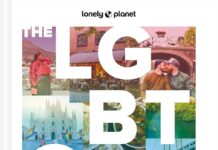(CNN) — Ignacio Nieto Carvajal and Miguel Piñas Rodríguez met by chance in a gay bar in Madrid, not long after Nieto Carvajal moved to the Spanish capital for work.
Nieto Carvajal almost didn’t go out that night, but he says he’s so glad he did.
“At the beginning it was like this crazy thing with butterflies and everything.”
Within a few months, Nieto Carvajal and Piñas Rodríguez were living together. Less than five years later, they were married.
A year after their wedding, the couple decided to up sticks and travel the world together, working remotely along the way.
Piñas Rodríguez quit his corporate 9-5 job and started working for himself in the web design/SEO arena. Nieto Carvajal was in the second year of running his own developer company.
The two sold all their furniture and most of their belongings in Spain and became fully-fledged digital nomads. Now in their 40s, they say they’ve never looked back.
Traveling the world

Miguel Piñas Rodríguez at the Pride Parade in Berlin in July 2016. Berlin was one of the couple’s early trips.
Courtesy Ignacio Nieto Carvajal and Miguel Piñas Rodríguez
The couple’s first stop was Riga, the capital of Latvia.
“We had been there before and we loved the city; it was affordable, small and comfortable,” says Nieto Carvajal. On previous visits, they’d also made connections at a co-working space called TechHub, which made settling in easier.
Before long, the couple headed on to Berlin, and soon they were hooked on the thrill of exploring a new place, and what Nieto Carvajal calls the “freedom” of not being tied down.
“You’re exploring new cultures and new people, and it’s so exciting,” he says.
The couple have since spent time in destinations including Vietnam, Bali, Estonia and Malaysia.
Embracing new cultures
“Let’s go there and see what happens,” is how Nieto Carvajal describes the couple’s travel process.
Whenever they arrive somewhere new, the two usually find an Airbnb “at least for a few days or weeks,” explains Piñas Rodríguez.
From there, they’ll generally find somewhere a bit more permanent to make home for a while.
They enjoy getting to know other travelers, but especially like meeting locals and getting their tips. The couple say the only downside to their lifestyle is saying farewell to people and places along the way.
“Every time we travel from one country to the other, I’m very sad at the beginning, because I miss the previous country, and I miss the people,” says Piñas Rodríguez.
But before long they’ll be embracing a new culture and making new friends — and for Piñas Rodríguez, those connections often come through food.
“I’m a foodie person. You learn how to cook new recipes, amazing ones,” he says, citing Thailand and Malaysia as two of his favorite food cultures he’s embraced over the years.
Traveling while gay

Nieto Carvajal at an exhibition supporting the LGBTQ community on Lover’s Bridge in Sofia, Bulgaria in August 2020.
Courtesy Ignacio Nieto Carvajal and Miguel Piñas Rodríguez
While Piñas Rodríguez and Nieto Carvajal love traveling, they say there are challenges that come hand-in-hand with digital nomad living — from dealing with dodgy WiFi to arriving at vacation rentals that don’t resemble the photos online.
And on top of those more minor ups and downs, the couple must also navigate traveling safely as gay men.
“Some countries are more welcoming than others to that,” says Nieto Carvajal, who explains that the couple were particularly concerned before heading to countries with little to no legal protection for LGBTQ people, such as Malaysia.
But Nieto Carvajal and Piñas Rodríguez say locals they met in Malaysia were very welcoming, and overall their experience of being gay digital nomads has been overwhelmingly positive.
When visiting countries known for being less accepting, Nieto Carvajal and Piñas Rodríguez don’t usually introduce themselves as a couple.
Instead, they say they let people they meet come to that understanding independently.
“People are more accepting than you would think,” says Nieto Carvajal. “They get to know you, and they get to this conclusion that these guys are together after a certain time.”
“Everybody will know,” adds Piñas Rodríguez .
“Eventually they realize that these two guys working together, traveling together, together all the time — they’re a couple,” says Nieto Carvajal.
The couple are also cautious about public displays of affection in certain countries. But although they adapt their behavior in certain situations, the couple say they’re very conscious of the importance of remaining true to themselves on their travels.
Nieto Carvajal’s advice to other LGBTQ travelers is to be aware of your surroundings and knowledgeable about the culture and context, but “don’t try to hide yourselves either.”
Piñas Rodríguez echoes this: “Be natural, and don’t hide.”
Digital nomads in a pandemic

Nieto Carvajal and Piñas Rodríguez in Lubljana, Slovenia in January 2020.
Courtesy Ignacio Nieto Carvajal and Miguel Piñas Rodríguez
At the beginning of 2020, Nieto Carvajal and Piñas Rodríguez were in Croatia. Within a couple of weeks, they’d moved on to Serbia.
They were hoping to travel to Canada that spring, and then head through the US and on to South America.
Then Covid-19 hit Europe.
“When we were in Serbia, everything kind of started to explode,” recalls Nieto Carvajal.
The couple moved to Bulgaria in late February, around the time Italy had become the European epicenter for coronavirus. They recall officials at Bulgarian customs assuming they were Italian, and initially refusing to let them in, before learning they were Spanish and ushering them through.
A week after they arrived in Bulgaria, many European countries closed their borders and went into lockdown. Nieto Carvajal and Piñas Rodríguez ended up in Bulgaria for almost a year.
“We decided to wait until at least we were vaccinated and everything was more stable,” says Nieto Carvajal.
He adds that the pandemic underlined a consequence of the digital nomad lifestyle they’d been hitherto unaware of: As they weren’t permanent residents in Bulgaria, they couldn’t get vaccinated right away.
But by spring 2021, they had their shots and headed to Turkey, then Spain for a long-awaited reunion with their family and on to Estonia for the next leg of their adventure.
Working remotely
Pre-pandemic, “digital nomad” was already becoming a bit of a buzzword.
And now — what with many people spending much of the past 18 months working remotely — more workers might be wondering if they can log in remotely in the future.
Piñas Rodríguez and Nieto Carvajal’s top tip for would-be digital nomads is to know how you’re going to make money before you hit the road.
The couple also caution against assuming social media or blogging will be a source of funds. In fact, somewhat unusually for digital nomads, Piñas Rodríguez and Nieto Carvajal largely eschew social media — Piñas Rodríguez sticks to changing his Facebook status when he moves countries and uploading the occasional photo to Instagram.
Nieto Carvajal doesn’t use social media apps at all, but does keep up a work blog.
Today, Nieto Carvajal and Piñas Rodríguez both work for the same organization, Your Company in Estonia. Nieto Carvajal is the CEO and Piñas Rodríguez is the CMO.
“We have had different companies in the past, but this common project really took off the ground so we focused on it and closed our previous companies,” says Nieto Carvajal.
Nieto Carvajal says the company helps entrepreneurs run online companies based out of Estonia, taking care of tax, accounting and compliance.
While the couple advocate getting your work affairs in order before you start traveling full-time, they also admit that sometimes you’ve got to just take a plunge into the unknown.
Don’t think you’re too old, or that it’s too late, they urge.
“The worst enemy of oneself is probably your own fears,” says Nieto Carvajal. “Don’t be so scared of trying.”
Future plans
Some digital nomads may view their travels as more of a short-term hiatus, rather than a long-term life choice, but Piñas Rodríguez and Nieto Carvajal say they’ve got no plans to stop traveling.
They’re hoping to make it to Canada and Latin America one day, and they’ve also got Georgia and South Africa on their long-term to-visit list.
They sometimes meet former digital nomads who fell in love with a particular destination and chose to make their stay there permanent.
Piñas Rodríguez reckons he could have stayed in Bali, while Nieto Carvajal loves Estonia.
But for now the couple don’t have any intentions to put down roots.
“Maybe when we are 60 or something,” says Nieto Carvajal.
“It is exciting to be able to share this together and we are grateful of every minute we spend together and every new place we discover hand in hand.”






